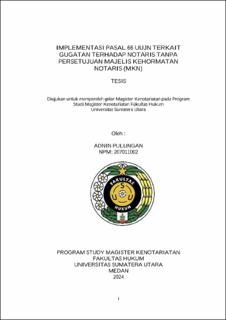Implementasi Pasal 66 UUJN Terkait Gugatan terhadap Notaris Tanpa Persetujuan Majelis Kehormatan Notaris (MKN)
Implementation of Article 66 UUJN Related to Suits Against Notaries Without the Approval of the Honorary Council of Notaries (MKN)

Date
2024Author
Pulungan, Adnin
Advisor(s)
Suhaidi
Azwar, Tengku Keizerina Devi
Metadata
Show full item recordAbstract
After the publication of Law no. 2 of 2014 concerning Amendments to Law no. 30 of 2004 concerning the Position of Notaries, Article 66 paragraph (1) was again tested at the Constitutional Court most recently with the PMK registration No. 16/PUU-XVII/2020, dated 23 June 2020. This concerns the issue of the implementation of Article 66 paragraph (1) UUJN, concerning the approval of the Notary Honorary Council regarding the summons of a Notary and the request for a photocopy of the minutes of the deed.
Regarding the implementation of Article 66, which is often tested at the Constitutional Court, a problem formulation arises regarding this matter, namely what is the legal concept of Article 66 paragraph (1) UUJN regarding lawsuits against Notaries without the approval of the Notary Honorary Council, and what are the legal remedies for Notaries against court decisions? which was detrimental to him due to his absence at the trial due to not receiving approval from the Notary Honorary Council. and how the protection of the deed of a Notary who refuses to be a witness based on Article 1909 paragraph (3) who becomes a defendant/co-defendant in a civil case is related to the obligation to keep the deed confidential.
This research is a type of descriptive normative legal research. aims to analyze the implementation of Article 66 UUJN regarding lawsuits against notaries without the approval of the honorary council of notaries (MKN) by using a case approach, a statutory approach and an analytical approach based on the theory of legal certainty, legal system theory and legal protection theory. The research results illustrate that the return of Article 66 UUJN aims to provide protection for Notaries in carrying out their duties and obligations as officials who are obliged to maintain the confidentiality of the contents of the deed, and the parties who make the deed, as well as the minutes of the deed which is a State document, based on statutory regulations other than UUJN, as well as providing reinforcement to the Honorary Council of Notaries in terms of certain authorities and limitations according to existing laws and regulations. Regarding the civil lawsuit process, in terms of maintaining the confidentiality of the contents of a deed, a Notary can provide information and defense only at the beginning and end of a deed without explaining the contents of the deed because a copy of the deed is sufficient to explain a legal event that has occurred.
Collections
- Master Theses (Notary) [2309]
